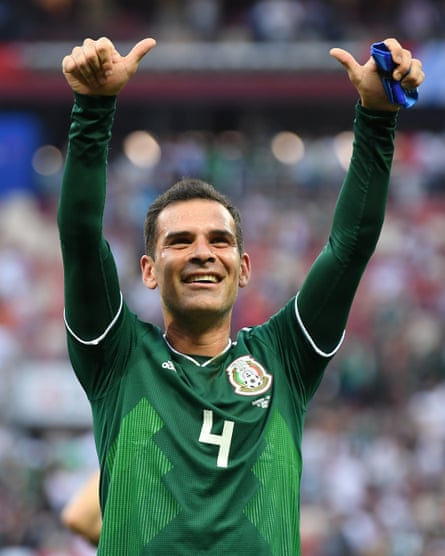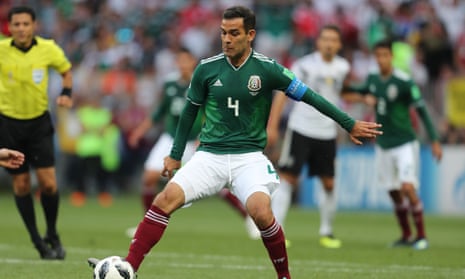For wheezing footballers of a certain age, Rafael Márquez is an inspiration. For a number of international brands, however, he is turning out to be a nightmare.
The Mexican defender is appearing at his fifth World Cup this summer at the age of 39. Thought by many to be his country’s best ever player, he helped seal a glorious upset victory against Germany on Sunday. Arriving from the bench with 15 minutes remaining, at full time he was quickly escorted off again, just in case he was caught next to a sponsor’s logo.
For nearly a year, Márquez has been on a US treasury department blacklist, accused of being a front for a Mexican drug lord. Márquez denies the accusation and has not been charged with any offence. He has, however, had all his assets in the US, and Mexican assets with ties to American companies, frozen.
If that feels like a drastic measure for Márquez, spare a thought for the poor US corporations who have forked out big dollar to be World Cup sponsors. If they knowingly engage with Márquez during the tournament, the US government could pursue fines of up to $10m (£7.5m) against a company and prison sentences against individuals.
In effect, sponsors are now employing a World Cup boycott, only against one man. Márquez’s training strip has been shorn of any adverts and Fifa has advised that if the player is interviewed after a game, he can’t stand in front of those mandatory Perspex boards covered in logos. According to the New York Times, there is even a plan for what should happen were Márquez to win a man of the match award, given that the prize is sponsored by the none-more-American Budweiser beer.
Iran have also fallen foul of a boycott, with Nike saying it couldn’t supply the team’s players with football boots because of US sanctions against the country.
The World Cup has a long history of boycotts. In 1934, inaugural winners Uruguay refused to defend their title in Italy in protest at how few European sides had turned out four years before. England also refused to play that year, although not in solidarity: the FA simply claimed the standard wasn’t good enough.
Despite the track record, this World Cup does feel different. That Russia should be hosting the tournament at all has long been contentious, and the defining image of the opening match was Vladimir Putin and Saudi Arabia’s crown prince Mohammed bin Salman enjoying convivial banter either side of Fifa president Gianni Infantino. The diplomatic measures taken around Márquez are another reminder of how the world’s greatest sporting event is just another political football.

